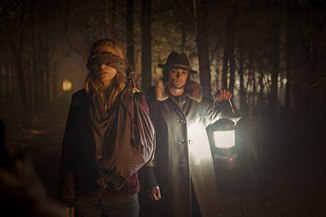|
|
The 400-Word Review: The EastBy Sean CollierJuly 15, 2013
Slickly (if derivatively) directed by Marling’s frequent collaborator Zal Batmanglij (who shares the writing credit), The East makes fine use of a formula and rises on the backs of its three key performances. Marling is relatable and wears conflict on her face in every frame; the story may not be particularly original, but Sarah is a wholly unique, and refreshing, protagonist. Skarsgård’s performance is a slightly lesser version of John Hawkes’ character in Martha Marcy May Marlene, which is a perfectly acceptable source to ape. As a fiery activist, Ellen Page provides a nice counterpoint. With a political topic this stark, The East can’t help but turn into a message movie. In some ways, its characterizations are made too black-and-white; reducing some of its antagonists to pure evil may make it too easy for the audience to miss the bigger message. Some of its secondary points about consumerism and the “freegan” culture are too muddy to truly land. If it’s possible to separate The East from its message, though, it’s an enjoyable and compelling drama in its own right — and a great showcase for Marling, an underrated artist. I’m not sure it’s important cinema, but it’s definitely a very good movie. Sean Collier is the Associate Editor of Pittsburgh Magazine and a member of the Broadcast Film Critics Association. Read more from Sean at pittsburghmagazine.com/afterdark
[ Read more 400 word movie reviews ]
[ View other movie reviews ]
[ View other columns by Sean Collier ] [ Email this column ]
|

|
|
|

|
Thursday, October 31, 2024
© 2024 Box Office Prophets, a division of One Of Us, Inc.


